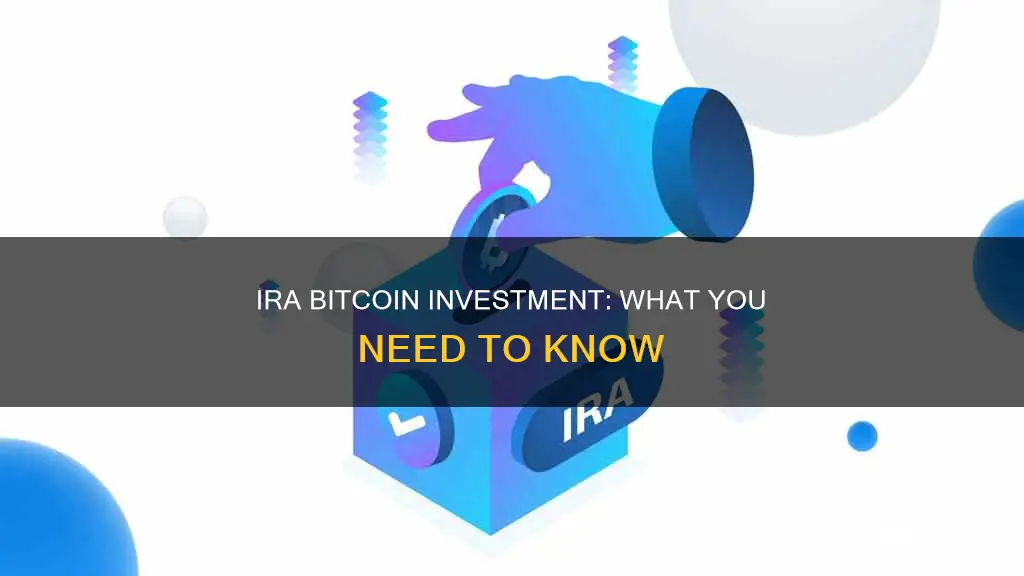
Bitcoin IRAs are a type of retirement account that allows individuals to invest in cryptocurrencies, such as Bitcoin, within their Individual Retirement Account (IRA). These accounts are considered an alternative investment option for retirement and are often used to diversify traditional retirement portfolios. While Bitcoin IRAs can be a tempting investment option due to the potential for high returns, it's important to note that they come with certain risks and drawbacks, including high fees and volatility.
| Characteristics | Values |
|---|---|
| Number of cryptocurrencies supported | 30+ (iTrust Capital), 60+ (Bitcoin IRA), 9 (BitIRA), 200+ (AltoIRA), 3 (Rocket Dollar) |
| TrustPilot rating | 4.7 stars (iTrust Capital), 4.3 stars (Bitcoin IRA), N/A (BitIRA), 4.4 stars (AltoIRA), N/A (Rocket Dollar) |
| Custodian | Fortress Trust (iTrust Capital), Ledger Enterprise (BitIRA), Digital Trust (Rocket Dollar) |
| Account minimum | $1,000 (iTrust Capital, Bitcoin IRA), $5,000 (BitIRA), $10 monthly fee for starter plan (AltoIRA), no minimum opening deposit (Rocket Dollar) |
| Fees | 1% on crypto transactions (iTrust Capital), 2% on crypto transactions (Bitcoin IRA), $50 account setup fee, $195 annual maintenance fee, 0.05% crypto storage fee (BitIRA), 1% fee for crypto transactions (AltoIRA), $15 monthly fee for Silver, $30 monthly fee for Gold, $360 setup fee for Silver, $600 for Gold (Rocket Dollar) |
What You'll Learn

Bitcoin IRAs can diversify your retirement portfolio
Bitcoin IRAs allow you to invest in Bitcoin and other cryptocurrencies using your retirement savings. They are a great way to diversify your portfolio and eliminate capital gains taxes.
A Bitcoin IRA is a self-directed IRA that allows you to invest in various cryptocurrencies using your retirement savings. It is considered an alternative investment for retirement.
With a Bitcoin IRA, you need to find a crypto exchange or a platform that facilitates the buying and selling of cryptocurrency. You will also need a custodian to hold your assets and satisfy IRS regulations. Some platforms, such as Swan and BitcoinIRA, provide both of these services, simplifying the process.
Benefits of a Bitcoin IRA
One of the main advantages of a Bitcoin IRA is that it adds diversification to your retirement portfolio, which can help protect your retirement accounts in the event of a major market downturn or other economic turmoil.
Additionally, Bitcoin IRAs can offer potential growth over the long term. While there is a significant risk of losses due to the volatile nature of cryptocurrencies, some investors believe that the possibility of growth outweighs the risks, especially if these are mitigated through a well-thought-out portfolio strategy.
Furthermore, there may be tax advantages to holding cryptocurrency in a Bitcoin IRA. For example, placing cryptocurrency in a Roth IRA means you won't be taxed on any capital gains, as you already paid taxes on the funds in the account.
Drawbacks of a Bitcoin IRA
One of the biggest drawbacks of a Bitcoin IRA is the high fees involved. These can include initial setup fees, custody fees, trading fees, annual maintenance fees, and transaction fees. It is important to carefully consider the fee structure of different providers before choosing a platform.
Another disadvantage is the extreme volatility of cryptocurrencies, which makes them a risky investment, especially for those nearing retirement age. The value of Bitcoin, for example, has fluctuated significantly over the years, reaching a high of $65,000 in November 2021, only to plummet to $15,500 just a year later.
Finally, there is the risk of security breaches and hacks, which could result in the loss of your digital assets. Therefore, it is crucial to prioritise security when choosing a Bitcoin IRA platform, ensuring they have robust security measures in place.
The Ultimate Guide to Buying Your First Bitcoin
You may want to see also

They eliminate capital gains taxes
Bitcoin IRAs can help eliminate capital gains taxes. The IRS treats cryptocurrencies like property, and any gains and losses from their sale are subject to capital gains tax. However, with a Bitcoin IRA, you can avoid paying these taxes.
There are two main types of Bitcoin IRAs: Traditional and Roth. Traditional Bitcoin IRAs are tax-deductible, meaning you can reduce your tax bill by deducting contributions to your IRA each year. However, you will have to pay income tax when you withdraw your funds at retirement. On the other hand, Roth Bitcoin IRAs are not tax-deductible, but you won't pay any tax when you withdraw your funds at retirement.
Both types of Bitcoin IRAs have a maximum contribution limit of $6,000 a year ($7,000 if you're aged 50 or older). Traditional IRAs are better if you expect to be in the same or a lower tax bracket at retirement, while Roth IRAs are better if you expect to be in a higher tax bracket.
Another benefit of Bitcoin IRAs is that they eliminate the need to track individual transactions for tax reporting. This is because cryptocurrencies held within an IRA are not subject to capital gains tax or income tax.
It's important to note that Bitcoin IRAs come with their own set of risks and costs. These accounts are considered high-risk due to the volatility of cryptocurrency valuations. Additionally, there may be high fees associated with setting up and maintaining a Bitcoin IRA account.
Overall, Bitcoin IRAs can be a powerful tool for reducing capital gains taxes, but investors should carefully consider the risks and costs before deciding to open one.
How Much Bitcoin Can You Buy With $100?
You may want to see also

They require specialised management
Bitcoin IRAs are considered an alternative investment for retirement. They can diversify your retirement portfolio and eliminate capital gains taxes. However, they are considered high risk and often involve additional fees and costs.
Because Bitcoin is a digital rather than tangible asset, cryptocurrency IRAs require specialised management, greater protection of sensitive data, and deep expertise in cryptocurrency trading. Bitcoin IRAs require custodians to manage them as the IRS considers Bitcoin property, taxing it like stocks and bonds. All self-directed IRAs use custodians to hold your assets and ensure your account adheres to IRS rules. There are specialised crypto custodians for Bitcoin IRAs.
The best Bitcoin IRA companies have a strong track record and offer transparent fee structures, low costs, and robust security measures. Additionally, partnerships with reputable custodians and insurers add an extra layer of protection.
- ITrustCapital: Best rates and fees
- Bitcoin IRA: Best digital asset insurance
- BitIRA: Best security
- Equity Trust: Best for self-directed investments
- Coin IRA: Best investor experience
The Ultimate Guide to Investing in Bitcoin Futures
You may want to see also

They are considered high risk
Bitcoin IRAs are considered high risk due to the volatility of the cryptocurrency market. The price of Bitcoin fluctuates wildly, even within the span of a day or a few minutes, making it a dangerous trading venture. For instance, in 2022, the price of Bitcoin dropped from almost $48,000 to lows of around $16,000.
Bitcoin is also not backed by governments or regulatory bodies, and its value is based on the perception of its worth by those who trade it. This means that if the market decides Bitcoin is no longer valuable, its value could plummet.
Additionally, Bitcoin IRAs are considered high risk because they are subject to significant price swings, and the custodians of these accounts may not have any fiduciary responsibility to the investor. The lack of standardised value and the high transaction costs associated with Bitcoin further contribute to the risk.
The unregulated and decentralised nature of cryptocurrencies also means that investors may have little recourse in the event of a dispute. The complexity of buying and selling cryptocurrency, along with the high fees involved, adds another layer of risk.
Lastly, the security of Bitcoin investments is a concern. Owners can lose access to their cryptocurrency if they misplace or forget their account passwords or if their digital keys are stolen. The lack of insurance for losses incurred through hacks or failures on cryptocurrency exchanges further exacerbates the risk.
Strike Bitcoin: A Guide to Investing in the Crypto Giant
You may want to see also

They often involve additional fees and costs
Bitcoin IRAs are considered an alternative investment for retirement, allowing investors to invest in various cryptocurrencies using their retirement savings. However, they often involve additional fees and costs, which can impact the overall returns on investments.
Firstly, there are initial setup fees, which can be substantial, with some providers charging several thousand dollars for setting up a self-directed IRA account. Additionally, there are recurring custody and maintenance fees charged by the providers. These fees are typically charged on a monthly or annual basis and can range from $20 to $30 per month or between $225 to $2,250 annually, depending on the provider and the size of the account.
Secondly, each cryptocurrency trade incurs fees from the service provider's trading partner and custodian. A typical provider may charge a percentage of the transaction value, such as 3.5% per purchase and 1% per sale, or a flat fee for each trade. For example, a provider may charge 1.25% on buys and 1.00% on sales. These transaction fees can add up, especially for frequent traders.
Furthermore, some platforms also charge additional security fees, custodian fees, or platform fees. For instance, a custodian fee of 1% or a security fee of 0.08% per month may be levied. These fees are essential to cover the costs of secure storage and protection of investors' digital assets.
It is worth noting that some platforms offer bundled services, such as Bitcoin IRA, which charges a one-time service fee, a custodian fee, and a security fee. Others, like Coin IRA, offer no-fee accounts with no annual or monthly maintenance fees and no charges for insured cold storage.
Lastly, investors may also be responsible for blockchain processing fees if they are not included in the regular charges. These fees are paid to the blockchain network to process and validate transactions, and they can vary depending on the network congestion and transaction complexity.
When considering a Bitcoin IRA, it is crucial to carefully review the fee structure of different providers and choose one that aligns with your investment strategy and budget.
Bitcoin Investment: Your Guide to Getting Rich
You may want to see also
Frequently asked questions
A Bitcoin IRA is a self-directed Individual Retirement Account (IRA) that allows you to invest in cryptocurrencies using your retirement savings.
First, choose a provider or platform, such as Swan or BitcoinIRA. Then, open an account by providing your personal details, including your legal name, address, Social Security number, and bank account information. Next, fund the account by transferring money from your bank account or rolling over an existing retirement account. Finally, place an order by deciding how much you want to invest in Bitcoin.
A Bitcoin IRA can add diversification to your retirement portfolio and eliminate capital gains taxes. It also allows you to invest in cryptocurrencies within a tax-advantaged retirement account.
Bitcoin IRAs tend to have higher fees than traditional or Roth IRAs, including transaction fees, monthly fees, custodian fees, and security fees. They are also considered high-risk investments due to the significant price swings and volatility associated with cryptocurrencies. Additionally, there is a risk of security breaches and hacks, which could result in the loss of your investment.







